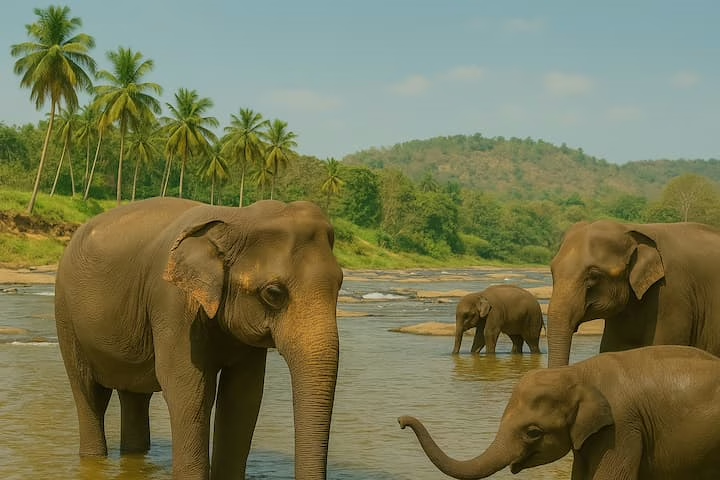TL;DR:
Pinnawala Elephant Orphanage in Sri Lanka cares for rescued and orphaned elephants. It’s about 90km from Colombo. You can watch elephants bathe in the river and see baby elephants being fed. When visiting Pinnawala, Sri Lanka, come early, be respectful to the animals, and check out nearby places too.
What is Pinnawala Elephant Orphanage?
The Elephant Orphanage is a unique sanctuary in Sri Lanka where injured and orphaned elephants are given a safe home. Started in 1975 with just 5 baby elephants, it now cares for many more. These elephants come from all over Sri Lanka after being found alone, hurt, or in danger.
The orphanage gives these gentle giants a safe place to live. It has become one of the most popular places to visit in Sri Lanka. People from all over the world come to see these amazing animals up close.
The Mission Behind Pinnawala Elephant Orphanage
Founded by the Sri Lankan Department of Wildlife Conservation, Pinnawala Elephant Orphanage has grown from a small facility to one of the world’s most successful elephant conservation projects. The sanctuary serves multiple purposes: caring for orphaned elephants, conducting research, and educating visitors about elephant conservation.
What makes Pinnawala Elephant Orphanage special is its approach to elephant welfare. Unlike traditional zoos, the elephants here live in semi-natural conditions with access to large open spaces spanning over 25 acres. The facility has successfully bred elephants in captivity, contributing to the conservation of Asian elephants and maintaining genetic diversity.
Each elephant at Pinnawala Elephant Orphanage has a unique story. Some arrive as orphaned calves separated from their mothers due to human-elephant conflict, while others come as injured adults requiring medical treatment. The dedicated veterinary team provides comprehensive care, from treating wounds to performing complex surgeries.
About Pinnawala, Sri Lanka
Pinnawala is a small village in Sri Lanka, about 90 km from Colombo (the main city). The area has beautiful green hills and rivers. Life here moves slowly compared to busy cities.
While visiting the elephants, you’ll also get a glimpse of local village life. There are small shops selling crafts and food that show Sri Lankan culture.
The Cultural Impact of Pinnawala, Sri Lanka
The village of Pinnawala, Sri Lanka holds deep cultural significance in the Sabaragamuwa Province. The local community has developed a unique relationship with elephants, viewing them as sacred beings deserving protection. The presence of Pinnawala Elephant Orphanage has transformed the local economy, with many villagers now working at the facility or in related tourism businesses.
The village’s location along the Maha Oya River has proven ideal for the orphanage’s operations. The river provides a natural bathing area for the elephants, while the surrounding lush landscape creates a picturesque setting that enhances the visitor experience at Pinnawala, Sri Lanka.
What to See at Pinnawala Elephant Orphanage
Baby Elephant Feeding
One of the best things to see is the feeding of baby elephants. Staff members give milk bottles to the youngest elephants several times a day. It’s a great time to take photos and learn how they care for these animals.
The feeding process at Pinnawala Elephant Orphanage is both educational and heartwarming. Orphaned calves require specialized care, including carefully formulated milk substitutes that provide essential nutrients. The feeding schedule is rigorous, with the youngest elephants receiving milk every few hours, similar to human infants.
Visitors can observe different feeding techniques used for elephants of various ages. While the smallest calves receive bottles, older elephants may be fed from buckets. The knowledgeable staff at Pinnawala, Sri Lanka are always happy to explain the nutritional requirements and feeding schedules.

River Bath Time
The most exciting part of any visit is watching elephants walk to the Maha Oya River for their bath. Twice a day, the elephants walk through the village streets to reach the river. They play and splash in the water. You can watch from the riverbank or from a restaurant while eating Sri Lankan food.
The river bathing experience at Pinnawala Elephant Orphanage is truly spectacular. The procession of elephants walking through the village creates a magical atmosphere. The elephants clearly enjoy their river time, engaging in playful behaviors like spraying water, rolling in mud, and socializing with companions.
This bathing ritual serves multiple purposes beyond hygiene. For elephants, water activities provide exercise, help regulate body temperature, and offer important social interaction opportunities. The mud and water also protect their skin from insects and sun exposure.
Educational Programs and Conservation Research
Pinnawala Elephant Orphanage offers extensive educational programs designed to increase awareness about elephant conservation. The facility’s educational center provides detailed information about Asian elephant biology, behavior, and the challenges they face in the wild.
The research conducted at Pinnawala Elephant Orphanage contributes valuable information to the global scientific community. Studies on elephant reproduction, behavior, and health help improve care standards for captive elephants worldwide. The facility’s breeding program has provided crucial insights into elephant pregnancy and calf development.
Learn About Elephants
There’s a small museum where you can learn about Asian elephants and why they need protection. This helps visitors understand why places like Pinnawala are important.
Paper Made from Elephant Poop
Yes, you read that right! Nearby, you’ll find a workshop where paper is made from elephant dung; a sustainable and quirky souvenir that supports conservation.
The elephant dung paper workshop near Pinnawala Elephant Orphanage represents an innovative approach to waste management and sustainable tourism. This eco-friendly initiative transforms elephant waste into beautiful paper products that serve as meaningful souvenirs while supporting conservation efforts. The workshop provides employment for local artisans while promoting environmental awareness among visitors to Pinnawala, Sri Lanka.
Tips for Your Visit to Pinnawala
When to Go
You can visit any time of year, but the best months are December to April when it doesn’t rain much. Try to go on weekdays instead of weekends when it’s crowded. Getting there early in the morning means you’ll see the first feeding and have plenty of time to look around.
Planning Your Visit to Pinnawala Elephant Orphanage
Proper planning enhances your experience at Pinnawala Elephant Orphanage. The facility operates on a structured schedule revolving around the elephants’ feeding and bathing times. Arriving early allows visitors to witness the morning feeding session and provides better photography opportunities.
Consider spending a full day at Pinnawala Elephant Orphanage. The morning feeding typically begins around 9:00 AM, followed by the first river bathing session around 10:00 AM. The afternoon includes another feeding and the second river bathing around 2:00 PM.
How to Get to Pinnawala, Sri Lanka
From Colombo, you can:
- Hire a car (2-3 hour drive)
- Join a tour group
- Take a bus to Kegalle, then a tuk-tuk (small taxi)
- Take a train to Rambukkana station, then a tuk-tuk
The most convenient option is hiring a private vehicle or joining an organized tour, allowing flexibility and stops at other attractions. For budget travelers, public transportation to Pinnawala, Sri Lanka is available but requires transfers. The train journey to Rambukkana offers scenic countryside views, followed by a short tuk-tuk ride to the orphanage.
Tickets and Hours
The orphanage is open every day from 8:30 AM to 6:00 PM. Foreign visitors pay more for tickets than locals. This money helps care for the elephants.
Be a Good Visitor
Remember these are wild animals that need respect:
- Keep a safe distance
- Follow all rules
- Do not touch or feed the elephants unless instructed by staff.
Responsible tourism practices are essential for maintaining elephant welfare and preserving the experience for future visitors. The experienced staff at Pinnawala, Sri Lanka are trained in elephant behavior and safety protocols. Following their guidance ensures both visitor safety and elephant welfare.
Other Places to Visit Nearby
Peradeniya Gardensz; About an hour’s drive away are beautiful botanical gardens with many types of plants and flowers.
Kandy City: About 1.5 hours away is Kandy, a sacred city with an important Buddhist temple that houses a tooth relic of Buddha.
Another Elephant Center: The Millennium Elephant Foundation is nearby and offers a different approach to elephant conservation.
Creating the Perfect Itinerary Around Pinnawala, Sri Lanka
The central location of Pinnawala Elephant Orphanage makes it ideal for exploring central Sri Lanka’s cultural and natural attractions. Many visitors combine their elephant experience with visits to ancient temples, spice gardens, and scenic mountain towns.
The Royal Botanical Gardens in Peradeniya showcase Sri Lanka’s incredible biodiversity with over 4,000 plant species. Kandy, the ancient capital, provides rich cultural experiences that complement the natural wonder of Pinnawala Elephant Orphanage. The Temple of the Sacred Tooth Relic offers insight into Sri Lankan Buddhist culture and history.
Where to Stay
Pinnawala has some small hotels and guesthouses. For nicer hotels, stay in nearby Kandy or Kegalle. Some places have rooms with views of the elephants walking to the river.
Accommodation options around Pinnawala Elephant Orphanage range from budget-friendly guesthouses to luxury resorts. Staying near Pinnawala, Sri Lanka allows visitors to experience the tranquil village atmosphere and witness the elephants’ routines multiple times. Several local guesthouses offer unique experiences, such as rooms with views of the elephant walking path and traditional Sri Lankan meals.
Food in Pinnawala, Sri Lanka
Restaurants along the river serve tasty Sri Lankan food. Try rice and curry or hoppers (a type of pancake) while watching elephants enjoy their bath time.
The dining options around Pinnawala Elephant Orphanage provide excellent opportunities to experience authentic Sri Lankan cuisine while enjoying elephant-watching views. Traditional dishes served in Pinnawala, Sri Lanka include rice and curry, featuring fragrant rice with various curries made from vegetables, lentils, and sometimes meat or fish.
Hoppers, a traditional Sri Lankan breakfast dish, are bowl-shaped pancakes made from fermented rice flour batter. These can be served plain, with an egg, or sweetened with palm treacle. String hoppers, made from steamed rice flour noodles, are another local specialty often served with curry.
Why You Should Visit
The Pinnawala Elephant Orphanage lets you see these amazing animals while supporting their care. It’s an unforgettable experience for families, animal lovers, and anyone interested in wildlife conservation in Sri Lanka. By visiting, you help protect these animals for the future.
The Lasting Impact of Visiting Pinnawala Elephant Orphanage
A visit to Pinnawala Elephant Orphanage creates lasting memories while contributing to important conservation work. The experience of observing elephants in their daily routines provides insights into animal behavior and intelligence that cannot be gained from books or documentaries.
Many visitors report that their time at Pinnawala, Sri Lanka fundamentally changed their understanding of elephant conservation and wildlife challenges. The educational impact extends beyond the immediate experience, as visitors often become advocates for elephant conservation, sharing their experiences and supporting conservation organizations.
The success of Pinnawala Elephant Orphanage as both a conservation facility and tourist destination demonstrates the potential for sustainable tourism to support wildlife protection. By visiting Pinnawala, Sri Lanka, tourists directly contribute to elephant care while supporting local communities and conservation research, providing hope for the future of elephant protection worldwide.




